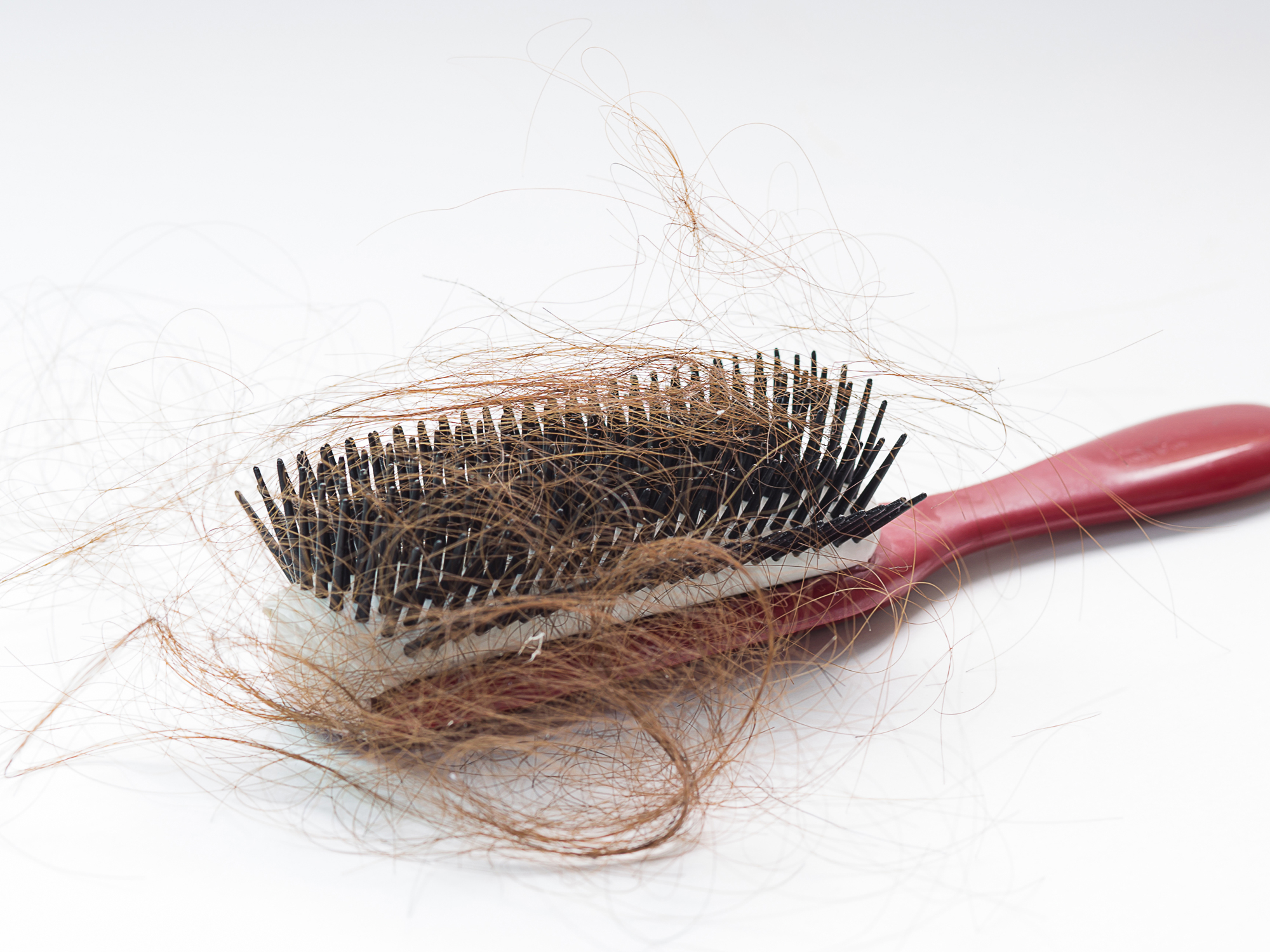Get Easy Health Digest™ in your inbox and don’t miss a thing when you subscribe today. Plus, get the free bonus report, Mother Nature’s Tips, Tricks and Remedies for Cholesterol, Blood Pressure & Blood Sugar as my way of saying welcome to the community!
Is bacteria behind your hair loss?

Is your hair feeling thinner than normal? Maybe you’re shedding a scary number of strands when you brush or wash your hair, or your ponytail feels thinner than normal. Maybe you even have noticeable bald patches.
There are a lot of potential reasons for hair loss. Male or female pattern baldness is the most common, and that’s genetic. Hair loss can also be caused by:
- Hormonal imbalances
- Scalp infections
- Severe stress
- Cancer treatment
- Hairstyles that pull your hair tight or chemical hair treatments
- Autoimmune conditions
But sometimes hair loss doesn’t have an obvious cause. And if that’s the case for you, a new study shows it may be tied to your microbiome.
If you’ve been following the latest discoveries in microbiome medicine, this may not be a shocker to you. It seems like every health condition around can be connected to the community of bacteria and other microorganisms living in your body
The good news is, if this is true, then practicing habits for a healthy microbiome may be able to curb or reverse your hair loss…
The connection between biotin, bacteria and hair loss
If you’ve ever tried supplements for your hair, skin and nails, then you may have noticed something… they all contain biotin.
Biotin (also known as B7) is a vitamin that your body uses to keep your hair, skin, nails, eyes, liver and nervous system healthy. And, it turns out, the amount of biotin your body has available to keep these body parts healthy may depend on the bacteria in your gut.
You see, some types of gut bacteria create biotin, while other types consume it. If you have too many of the biotin-consuming bacteria, it can lead to a biotin deficiency that causes hair loss.
In fact, a recent study from Japanese researchers found that mice who receive a long course of antibiotics develop hair loss. These researchers took a closer look at the bacteria in the mice’s guts after antibiotic treatment, because they suspected the antibiotics messed up their microbial balance and, as a result, their biotin levels. And here’s what they found…
After taking antibiotics, mice had a lot more of a lactic acid bacteria called Lactobacillus murinus in their gut. This is a type of bacteria that eats biotin. So, they suspect that the bacteria contribute to a biotin deficiency, which contributes to hair loss.
Could biotin-eating bacteria be sabotaging your biotin levels and hair health too? The research on biotin, bacteria and hair loss is still preliminary, but anything’s possible.
Either way, it wouldn’t hurt to up your intake of biotin-rich foods and take steps to support a healthy microbiome…
How to get better biotin levels and microbial balance
Biotin deficiency is rare in the U.S., but certain people are more at risk for it, like pregnant and breastfeeding women, people with celiac disease or other diseases that impair their ability to absorb nutrients, and people with alcohol dependence.
That means you probably don’t need to take a biotin supplement unless you fall into one of those high-risk categories. Adults should, however, try to get about 30 mcg of biotin per day from foods like:
- Grass-fed meats
- Liver
- Eggs
- Brewer’s yeast
- Nutritional yeast
- Almonds
- Peanuts
- Walnuts
- Pecans
- Salmon
- Avocados
- Sweet Potatoes
- Dairy products, like milk, cheese and yogurt
- Cauliflower
You should also do everything in your power to keep your microbiome balanced…both for your hair’s sake and for your overall health. You can do that by:
- Keeping your antibiotic intake to a minimum. They’re the biggest culprits behind an unbalanced microbiome.
- Getting probiotics daily… either through fermented foods like yogurt, sauerkraut and kombucha, or through a supplement.
- Eating lots of fiber. Fiber feeds the beneficial bacteria in your gut.
- Cutting back on sugar. You don’t necessarily have to cut it out completely. Just be aware that the sweet stuff tends to feed the bad bacteria in your gut, and throw off your microbial balance.
- Exercising. Believe it or not, spending time in the gym directly affects your microbiome for the better.
- Keeping stress levels low. Stress is bad for your microbiome, so do what you can to reduce or relieve stress in your life.
Editor’s note: Are you feeling unusually tired? You may think this is normal aging, but the problem could be your master hormone. When it’s not working, your risk of age-related diseases skyrockets. To reset what many call “the trigger for all disease” and live better, longer, click here to discover The Insulin Factor: How to Repair Your Body’s Master Controller and Conquer Chronic Disease!
Sources:
- Hair loss — Mayo Clinic. Retrieved May 8, 2018.
- Pattern hair loss could be due to gut bacteria — MedicalXpress. Retrieved May 8, 2018.
- What is biotin and what does it do? — National Institutes of Health. Retrieved May 8, 2018.
- Health Benefits of Biotin — Healthline. Retrieved May 8, 2018.
- All you should know about biotin deficiency — Medical News Today. Retrieved May 8, 2018.
- What you should know about biotin-rich foods — Medical News Today. Retrieved May 8, 2018.
- How to keep your gut healthy over the holidays — Medical News Today. Retrieved May 8, 2018.













